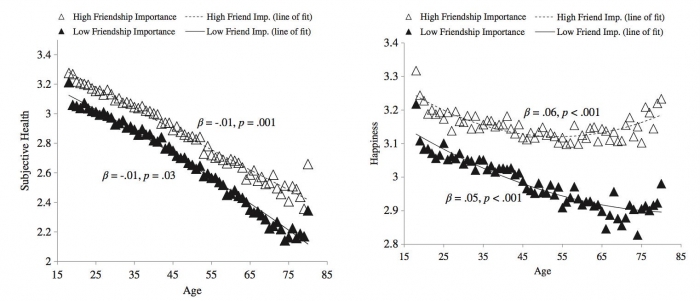"Friendships become even more important as we age," says psychologist William Chopik from Michigan State University.
"Keeping a few really good friends around can make a world of difference for our health and well-being. So it's smart to invest in the friendships that make you happiest."
That's not to say you should ditch your fam altogether and throw your entire lot in with your besties - we all know friendships can fall apart far easier than you can get an emancipation certificate or a new identity.
But the evidence suggests that we need to keep in mind that the relationships we don't choose can have less of an impact on our lives as we age than those we do.
To figure this out, Chopik analysed survey information about relationships and self-rated health and happiness from 271,053 participants across all age groups from nearly 100 countries around the world.
He then compared the results to a separate survey about relationship support, relationship strain, and chronic illness, involving 7,481 older adults (median age 68) in the US.
The first survey revealed that, overall, those who valued both their family and friendship relationships enjoyed greater health and higher happiness.
But among the older participants, valuing friendships became a stronger predictor of health and happiness than valuing family.

The second survey took this notion even further by revealing that friendships have a far greater influence on our physical and emotional state as we age than our family relationships.
This can be a good and a bad thing, because if your friendships are awesome and provide you with support, you're more likely to be happier and free from health concerns than if you get your support from your family members alone.
But this goes the other way too, because if your friendships become a source of stress in older age, you're more likely to experience chronic illness, such as high blood pressure, diabetes, cancer, or coronary heart disease.
Interestingly, family relationships with people other than spouses and immediate children were found to have little influence on an individual's health and well-being in older adulthood across both surveys.
"Friendships were very influential - when friends were the source of strain, participants reported more chronic illnesses; when friends were the source of support, participants were happier," Chopik reports in his study.
"This finding is consistent with previous research showing that friendship quality often predicts health more so than the quality of other relationships."
There are a number of important limitations in this study, such as self-reporting happiness, which is not an objective measure, and giving equal weight to the various chronic illnesses - having high blood pressure generally doesn't carry the same emotional weight as having cancer.
But the results do reflect what many of us have likely already experienced, even before we hit 'old age' - we benefit from our friends because we get to choose the ones who make us feel happiest, whereas family can often come with inescapable baggage and stress.
The finding supports a similar study from 2005, which found that Australians aged 70 or older tended to live significantly longer if they had more strong friendships.
A network of good friends was linked to a 22 percent reduction in the risk of dying during the 10-year follow-up period of the study, when compared to close ties with children or relatives.
So while studies like these can't predict your future as an individual, they do provide some pretty valuable life advice: don't put all your eggs in one basket.
Your family will always be your blood, but the friendships you make now could end up being an invaluable investment for your health and happiness later.
"Friendships help us stave off loneliness, but are often harder to maintain across the lifespan," says Chopik.
"If a friendship has survived the test of time, you know it must be a good one - a person you turn to for help and advice often and a person you wanted in your life."
More about: #Friendship
















































